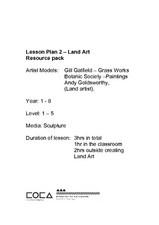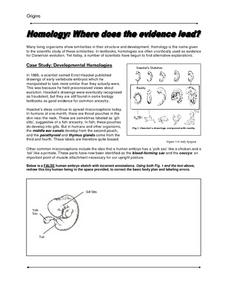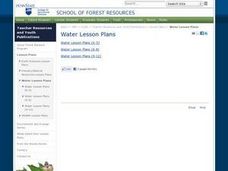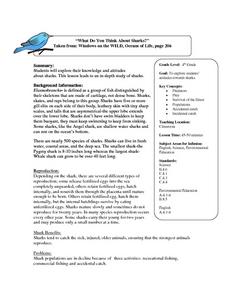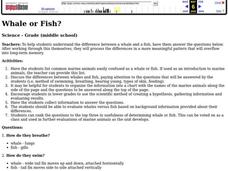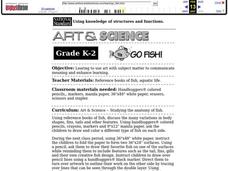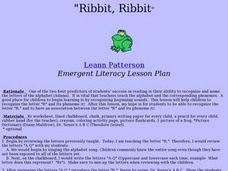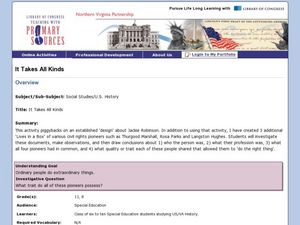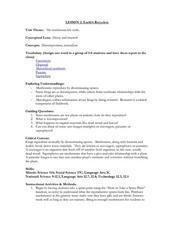Curated OER
Seeds, Miraculous Seeds
Students investigate the growth of seeds. In this agricultural lesson, students dissect a bean and corn seed and identify the parts of the seed. Students observe the development of a pinto bean seed and record observations on the...
Curated OER
Which Bear?
Students study bears. In this science lesson, students compare black, grizzly and polar bears. Students measure the bear tracks and compare the bear habitats and diet.
Curated OER
Land Art
Students use natural materials outside to create a work of art. In this land art lesson plan, students plan their sculpture inside in one day and create it outside over a period of 2 days.
Curated OER
Addition Properties
Student study addition properties. For this addition properties lesson, students use multiple methods to solve various types of problems. Students illustrate and describe in various ways the Commutative Property of Addition. Students...
Curated OER
Multiples of a
Sixth graders use problem solving strategies to evaluate linear expressions by substituting values. They substitute values for the letters in their names before applying the concept to other words. They complete worksheets in which they...
Curated OER
Kitchen Garbage: Mushroom Prints
In this mushrooms worksheet, students create mushroom prints by letting the spores come down onto another piece of paper. Students then answer 3 short answer questions about their spores.
Curated OER
Nudibranchs-Splendid Sea Slugs
Learners brainstorm a list of colorful animals and research why they are colorful. For this biology lesson, students sketch what a nudibranchs look like before watching a video. They compare their sketch to the actual nudibranchs photo.
Curated OER
Investigation 11 - Utah Fish
Fourth graders examine a particular Utah fish and then create a poster that shares what they learned. They access websites imbedded in this plan to aide them in their research.
Curated OER
CSI Clamshell Investigation
Students explore predator/prey relationships. They research information on moon snails and claims. Students draw conclusions from the data collected. They use math and graphing to determine if there is a relationship to the clam's size...
Curated OER
Homology: Where Does The Evidence Lead
Learners are introduced to the topic of homology. In groups, they read a case study and compare different drawings of early vertebrate emryos. They work together to answer discussion questions and label the various parts of each embryo.
Curated OER
Name That Shark!
In this online quiz worksheet, students answer a set of multiple choice trivia questions about names of sharks. Page has a link to answers.
Curated OER
"Pennsylvania Watersheds, Many Ways to the Sea"
Students trace a molecule of water through the water cycle including each of its three loops. They describe why evapotranspiration demands the largest portion of total precipitation falling on a forested watershed.
Curated OER
Fish Workings
Students observe, hypothesize, and draw conclusions regarding fish. They examine their anatomy, and how they function in their environment.
Curated OER
What Do You Think About Sharks?
Fourth graders explore sharks. They read a story about sharks and act out using Reader's Theater. They discuss fact and attitude statements about sharks and complete a Shark Survey. They create a shark promotion brochure informing...
Curated OER
Homographs- British Worksheet
In this grammar activity, students read the definition of a homograph on page one of these two pages. They write a homograph to complete 5 on the second page. They see clip art pictures that give them clues as to which homograph to choose.
Curated OER
Whale or Fish?
Students explain the difference between a whale and a fish. After working through this themselves, they process the differences in a more meaningful pattern that overflows into long-term memory.
Curated OER
Somthing's Fishy
Students, using drawing tools on the computer, or with paper and pencil, diagram and label a fish.
Curated OER
Potato Fish Adaptations
Students examine fish adaptations. They identify types of adaptations, and create a 3-D model of an imaginary fish that demonstrates various adaptations using a potato and craft materials.
Curated OER
Ribbit! Ribbit!
Students research a frog's life cycle and habitat using books, the Internet and lecture. Students make origami frogs, write letters to Toad from Arnold Lobel's "Frog and Toad" and participate in a simulated camouflage activity.
Curated OER
It Takes All Kinds!
Students view video clips and observe similarities and differences between animals. They sort animals into groups for a zoo. They make a graph of their observations and review scientific classifications.
Curated OER
My Favorite Meal
Students investigate ecological systems and the multiple uses of the environment by studying the osprey population.
Curated OER
Earth's Recyclers
Students work together in groups to report on different topics related to decomposition. They answer questions and share their answers with the class. They discuss any topic that is unclear.
Curated OER
When Fish Die
Learners discuss what to do with a very sick fish and help it to die without much pain. As a class, they answer questions about the fish and if they believe it is suffering or not. Using their own experiences, they share how they dealt...
Other popular searches
- Lungs vs. Gills
- Fish Gills
- Lungs Gills
- Sharks Gills
- Fish and Gills
- Gills Oxygen
- Lungs vs Gills
- Gills and Lungs
- Gills Free
- Gills Free Worksheet
- Gills or Lungs




